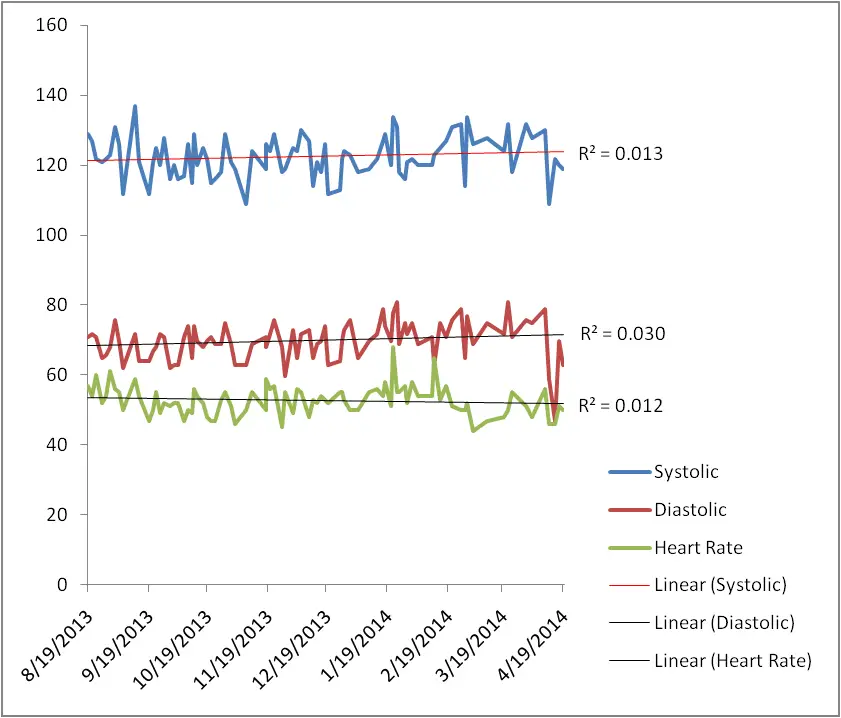Do you have a fast heart rate, i.e., more than 80 beats per minute? Chances are, you are either stressed or not getting enough exercise. Find out how aerobics can slow down your heart rate.
I have this nagging question in mind since I decided to undertake an aerobics program using Dr. Kenneth Cooper’s book on aerobics. This is about one’s heart rate getting slower when regularly exercising. Did my heart rate actually slow down because aerobics exercise has become an integral part of my weekly routine?
On page 101 of Dr. Cooper’s book aptly titled “aerobics,” he mentioned that the heart is such a magnificent engine that, when given less work, will work faster and less efficiently. When you make more demands on it through aerobics, it will become more efficient. That means that for a deconditioned man who does not exercise at all, his resting rate is about 80 or more while a conditioned man who exercises regularly, will have a resting heart rate of about 60 beats per minute or less. In 24 hours at rest, a deconditioned man’s heart will have to beat more than a conditioned man. He went on to explain things about the heart and how it becomes stronger and more efficient with training.
While browsing information along this topic, I found out that top athletes have heart rates of less than 30. Miguel Indurain, a top cyclist has a heart rate of 28.
Does Aerobics Slow Down Heart Rate?
I love to do a simple research to test this information although I am aware that there were already studies done to answer this question. I would like to answer the question using myself as the subject of the study and to see my progress. This is my case.
I will deliberately skip the review of literature and go directly to the objective of this experiment. My research question is:
Does aerobics slow down the heart rate through time?
My Method
I decided that I will use the graphical approach to find out if my heart rate indeed is slowing down through time. This is what researchers call a time series analysis. Will the heart rate trend be going down?
I recorded my heart rate each time I check my blood pressure upon waking up in the morning using an OMRON REM-1 wrist blood pressure monitor. So, I have added information that I will include in this article – my blood pressure.
I started recording the BP information and heart rate last August 8, 2013 up to this time. I do this routine before my 6 o’clock am run so it’s basically my resting heart rate after 6-8 hours of sleep. There were no significant changes in my lifestyle (i.e., no changes in diet, medication, workload, among other things) since I embarked on the aerobics program.
I plotted data gathered for eight months although I have done aerobics since January 2013. But then I failed to record heart rate or BP data until August 2013.
Results
I found out interesting information after plotting the data in Excel. This is easily done by plotting the date and corresponding BP values and heart rate in one row. I clicked on the Insert menu then hit the Line graph and selected the cells for date, diastolic, systolic, and heart rate values.
Indeed, my heart rate decreased through time as indicated by the heart rate trend line. However, I noticed that the trend for blood pressure goes towards the opposite direction. Both the systolic and diastolic pressure follow an upward trend (Figure 1).

What does this result suggest? This may mean that as the heart grows stronger (low heart beat), the pressure it exerts on the blood vessels also increases. On the other hand, this suggests that my blood vessels become less elastic through time.
This finding requires further reading – a review of literature focused on the relationship between the heart rate of a healthy person and his blood pressure. Is this trend the same for all people who engaged in aerobics and experienced the training effect?
Training effect is the body’s adaptation to a training program manifested by improvement in functional capacity and strength. In my case, this simply means that I am able to run a 6 kilometer stretch of road without stopping to rest. When I started the aerobics program last January 2013, I can barely finish a mile and my legs ached.
Well, whatever the increasing blood pressure means, what is important is that I found out that aerobics does decrease the heart rate through time. On March 4, 2014, I recorded my lowest heart rate ever: 44. And I confirmed this by manually counting my pulse in one minute. And I also discovered that I can lower it at will by breathing deeply.
Where does this training bring me? An athlete friend invited me to join a 10K run last February 23, 2014. He noticed that I jog regularly and assured me that I will be able to finish the distance. I explained that I have been jogging just to address a health issue and is not that confident to test my performance. On second thought, I said why not?
I realized I can make the distance and gained confidence that I could be a marathoner. In fact, I’ve already joined and finished two 10-kilometer runs clocking 1:05 and 1:00, respectively. And I aim to finish the upcoming 10K run next month in less than an hour. This was made possible through serious self-training and with determination.
Do you have high blood pressure? Or easily feel tired after a few exertions? Try aerobics and take control of your health.
Just a note of caution: before engaging in strenuous exercise, have a medical check up to rule out any heart problem.
© 2014 April 19 P. A. Regoniel



